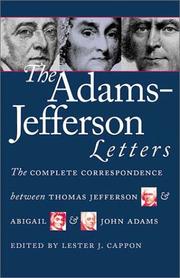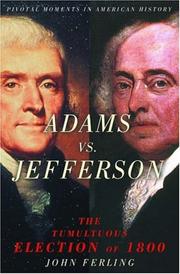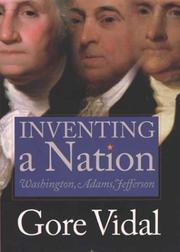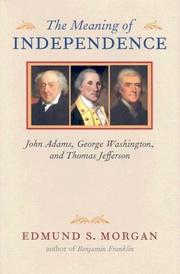| Listing 1 - 10 of 15 | << page >> |
Sort by
|
Book
ISBN: 0813149363 9780813149363 9780813123073 081319265X Year: 2009 Publisher: Lexington, Kentucky
Abstract | Keywords | Export | Availability | Bookmark
 Loading...
Loading...Choose an application
- Reference Manager
- EndNote
- RefWorks (Direct export to RefWorks)
After more than two hundred years in the shadows of Washington and Jefferson, John Adams enjoys fame as one of our top presidents. Of unprepossessing appearance and feisty temperament, he expressed his personal feelings in copious correspondence and public documents along with two unfinished autobiographies.Paul M. Zall draws from Adams's own letters, diaries, notes and autobiographies to create a fresh portrait. Adams's writings, both public and private, trace his rise from country lawyer to the nation's highest office by the sheer force of his personality. Lacking the advantages of money, co
Presidents --- Adams, John, --- Novanglus,
Book
ISBN: 9781629487922 1629487929 9781629487809 1629487805 Year: 2011 Publisher: Hauppauge, New York
Abstract | Keywords | Export | Availability | Bookmark
 Loading...
Loading...Choose an application
- Reference Manager
- EndNote
- RefWorks (Direct export to RefWorks)
Presidents --- Adams, John, --- Novanglus,

ISBN: 0807818070 1469600269 0807842303 0807807699 0807838926 9781469600260 9780807838921 9780807818077 9780807842300 9780807807699 9798890886750 Year: 1987 Publisher: Chapel Hill, [North Carolina] ; London, [England] : Published for the Omohundro Institute of Early American History and Culture, Williamsburg, Virginia, by the University of North Carolina Press,
Abstract | Keywords | Export | Availability | Bookmark
 Loading...
Loading...Choose an application
- Reference Manager
- EndNote
- RefWorks (Direct export to RefWorks)
Presidents --- Presidents' spouses --- Adams, John, --- Jefferson, Thomas, --- Adams, Abigail, --- Adams, Abigail Smith, --- Smith, Abigail, --- Novanglus, --- Correspondence.

ISBN: 0195167716 0195184173 9780195184174 9780195167719 1602567557 9781602567559 9786610534203 6610534209 9780195189063 019518906X 1280534206 9781280534201 0197711049 Year: 2004 Publisher: New York
Abstract | Keywords | Export | Availability | Bookmark
 Loading...
Loading...Choose an application
- Reference Manager
- EndNote
- RefWorks (Direct export to RefWorks)
Despite defects in the constitution, the US election of 1800 was significant as it represented the first transfer of power between the outgoing Federalist party and the incoming Republicans. This text plots the most significant developments of this historic election.
Presidents --- United States --- Election --- 1800 --- Jefferson, Thomas --- Adams, John --- Politics and government --- 1797-1801 --- Jefferson, Thomas, --- Adams, John, --- Novanglus,
Book
ISBN: 0820359033 0820359041 082035905X Year: 1976 Publisher: Athens : University of Georgia Press,
Abstract | Keywords | Export | Availability | Bookmark
 Loading...
Loading...Choose an application
- Reference Manager
- EndNote
- RefWorks (Direct export to RefWorks)
Presidents. --- United States --- Politics and government --- Presidency --- Heads of state --- Executive power --- Adams, John, --- Jefferson, Thomas, --- Novanglus,

ISBN: 1283950227 0300127928 9780300127928 0300101716 9780300101713 0300105924 9780300105926 Year: 2003 Publisher: New Haven : Yale University Press,
Abstract | Keywords | Export | Availability | Bookmark
 Loading...
Loading...Choose an application
- Reference Manager
- EndNote
- RefWorks (Direct export to RefWorks)
Statesmen --- Washington, George, --- Adams, John, --- Jefferson, Thomas, --- Novanglus, --- Vashington, Dzhordzh, --- Waszyngton, Jerzy, --- Washington, Georg, --- Uashingktoien, Geeorg, --- Uashingtʻn, Gēorg, --- װאשינגטאן, דזשארדזש, --- ジョージワシントン, --- Washington, G. --- United States --- Politics and government

ISBN: 0813906946 0783742274 Year: 2004 Volume: *1 Publisher: Charlottesville : University of Virginia Press,
Abstract | Keywords | Export | Availability | Bookmark
 Loading...
Loading...Choose an application
- Reference Manager
- EndNote
- RefWorks (Direct export to RefWorks)
History of North America --- Washington, George --- Adams, John --- Jefferson, Thomas --- Autonomy --- United States - General --- Regions & Countries - Americas --- History & Archaeology --- Independence --- Self-government --- International law --- Political science --- Sovereignty --- History --- Adams, John, --- Washington, George, --- Jefferson, Thomas, --- Vashington, Dzhordzh, --- Waszyngton, Jerzy, --- Washington, Georg, --- Uashingktoien, Geeorg, --- Uashingtʻn, Gēorg, --- װאשינגטאן, דזשארדזש, --- ジョージワシントン, --- Novanglus, --- Political and social views. --- United States --- Politics and government --- Washington, G.

ISBN: 0300101716 9780300101713 Year: 2003 Publisher: New Haven, CT ; London : Yale University Press,
Abstract | Keywords | Export | Availability | Bookmark
 Loading...
Loading...Choose an application
- Reference Manager
- EndNote
- RefWorks (Direct export to RefWorks)
Washington, George, --- Adams, John, --- Jefferson, Thomas, --- #KVHA:Politiek; Verenigde Staten --- #KVHA:Geschiedenis; Verenigde Staten --- #KVHA:American Studies --- Statesmen --- Vashington, Dzhordzh, --- Waszyngton, Jerzy, --- Washington, Georg, --- Uashingktoien, Geeorg, --- Uashingtʻn, Gēorg, --- װאשינגטאן, דזשארדזש, --- ジョージワシントン, --- Novanglus, --- United States --- Politics and government --- Jefferson, Thomas --- Washington, G. --- ETATS-UNIS --- HOMMES POLITIQUES --- HOMMES D'ETAT --- POLITIQUE ET GOUVERNEMENT --- 1775-1783 --- 1783-1809
Book
ISBN: 3319664778 331966476X Year: 2018 Publisher: Cham : Springer International Publishing : Imprint: Palgrave Macmillan,
Abstract | Keywords | Export | Availability | Bookmark
 Loading...
Loading...Choose an application
- Reference Manager
- EndNote
- RefWorks (Direct export to RefWorks)
This book contributes to the increasing interest in John Adams and his political and legal thought by examining his work on the medieval British Empire. For Adams, the conflict with England was constitutional because there was no British Empire, only numerous territories including the American colonies not consolidated into a constitutional structure. Each had a unique relationship to the English. In two series of essays he rejected the Parliament’s claim to legislate for the internal governance of the American colonies. His Dissertation on the Canon and Feudal Law (1765) identified these claims with the Yoke, Norman tyranny over the defeated Saxons after 1066. Parliament was seeking to treat the colonists in similar fashion. The Novanglus essays (1774-75), traced the origin of the colonies, demonstrating that Parliament played no role in their establishment and so had no role in their internal governance without the colonists’ subsequent consent.
Constitutional history --- Adams, John, --- Criticism and interpretation. --- Novanglus, --- United States-History. --- Great Britain-History. --- History-Philosophy. --- Imperialism. --- World politics. --- US History. --- History of Britain and Ireland. --- Philosophy of History. --- Imperialism and Colonialism. --- Political History. --- Colonialism --- Global politics --- International politics --- Political history --- Political science --- World history --- Eastern question --- Geopolitics --- International organization --- International relations --- Empires --- Expansion (United States politics) --- Neocolonialism --- Anti-imperialist movements --- Caesarism --- Chauvinism and jingoism --- Militarism --- United States—History. --- Great Britain—History. --- History—Philosophy. --- United States --- Great Britain --- History --- History. --- Philosophy.
Book
ISBN: 9780226037431 9780226037448 0226037444 0226037436 1282901761 9786612901768 Year: 2010 Publisher: Chicago University of Chicago Press
Abstract | Keywords | Export | Availability | Bookmark
 Loading...
Loading...Choose an application
- Reference Manager
- EndNote
- RefWorks (Direct export to RefWorks)
During the many years that they were separated by the perils of the American Revolution, John and Abigail Adams exchanged hundreds of letters. Writing to each other of public events and private feelings, loyalty and love, revolution and parenting, they wove a tapestry of correspondence that has become a cherished part of American history and literature. With Abigail and John Adams, historian G. J. Barker-Benfield mines those familiar letters to a new purpose: teasing out the ways in which they reflected-and helped transform-a language of sensibility, inherited from Britain but, amid the revolutionary fervor, becoming Americanized. Sensibility-a heightened moral consciousness of feeling, rooted in the theories of such thinkers as Descartes, Locke, and Adam Smith and including a "moral sense" akin to the physical senses-threads throughout these letters. As Barker-Benfield makes clear, sensibility was the fertile, humanizing ground on which the Adamses not only founded their marriage, but also the "abhorrence of injustice and inhumanity" they and their contemporaries hoped to plant at the heart of the new nation. Bringing together their correspondence with a wealth of fascinating detail about life and thought, courtship and sex, gender and parenting, and class and politics in the revolutionary generation and beyond, Abigail and John Adams draws a lively, convincing portrait of a marriage endangered by separation, yet surviving by the same ideas and idealism that drove the revolution itself. A feast of ideas that never neglects the real lives of the man and woman at its center, Abigail and John Adams takes readers into the heart of an unforgettable union in order to illuminate the first days of our nation-and explore our earliest understandings of what it might mean to be an American.
Adams, Abigail Smith --- Adams, John --- Sentimentalism --- United States --- Social life and customs --- To 1775 --- 1783-1865 --- 1775-1783 --- Sentimentalism. --- Adams, Abigail, --- Adams, John, --- Sentimentality --- Emotions --- Novanglus, --- Adams, Abigail Smith, --- Smith, Abigail, --- history, usa, united states of america, historical, presidents, presidential, american revolution, revolutionary war, letters, communication, married couple, writing to each other, correspondence, sensibility, americanized, cultural studies, culture, moral consciousness, morality, adam smith, john locke, rene descartes, injustice, inhumanity, courtship, sex, relationships, parenting, politics, social life, customs, reformation, masculinity, femininity, sentimentalism.
| Listing 1 - 10 of 15 | << page >> |
Sort by
|

 Search
Search Feedback
Feedback About UniCat
About UniCat  Help
Help News
News